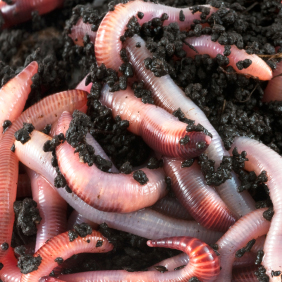Why Red Wigglers Are Necessary for Natural Farming
Red wigglers play a crucial function in chemical-free farming, largely with their unique capability to break down natural products and enhance soil health and wellness. Their activity not only improves the soil with essential nutrients yet also promotes a flourishing environment essential for lasting farming. The physical processes they involve in, such as aeration and dampness retention, contribute considerably to enhanced plant returns. The level of their influence on farming methods and dirt biology increases intriguing questions about the future of natural farming. red wigglers. What ramifications might this have for farming techniques?
Duty of Red Wigglers in Soil Wellness

Furthermore, red wigglers boost soil structure by developing channels as they tunnel. These networks improve oygenation and water seepage, promoting a healthier origin atmosphere. Their task also helps in keeping ideal moisture levels, which is important for healthy plant growth.

Benefits of Worm Castings
Worm spreadings, the nutrient-rich waste matter generated by red wigglers, offer as a powerful amendment for organic farming. These spreadings are loaded with crucial nutrients such as nitrogen, phosphorus, and potassium, which are crucial for plant development. Unlike artificial fertilizers, worm spreadings launch nutrients slowly, offering a steady supply in time and reducing the danger of nutrient leaching and drainage.
Additionally, worm spreadings boost soil framework and aeration, advertising healthier origin systems. Their high raw material content boosts dampness retention, enabling plants to much better hold up against drought problems. Additionally, worm spreadings contain valuable bacteria that support plant health and wellness by subduing pathogens and enhancing nutrition uptake.
The application of worm spreadings can bring about enhanced plant yields and enhanced top quality of fruit and vegetables, making them an indispensable source for organic farmers. Their usage additionally aligns with sustainable farming practices, adding to soil fertility without the unfavorable ecological influences connected with chemical plant foods. Overall, the consolidation of worm spreadings right into agricultural techniques fosters a more resilient and effective environment, emphasizing the importance of red wigglers in chemical-free farming systems.

Enhancing Nutrient Cycling
(red wiggler compost bin)Nutrition cycling is an essential procedure in natural farming, and the assimilation of red wigglers plays an essential role in boosting this cycle. These earthworms add considerably to the failure of raw material, promoting the transformation of complex natural materials into less complex, much more accessible nutrients for plants. As red wigglers eat decaying raw material, they excrete nutrient-rich castings, which are bursting with useful germs. This microbial task further aids in the decay procedure, ensuring that vital nutrients are conveniently offered for plant uptake.
In addition, red wigglers assist to speed up the mineralization of nutrients, converting them from inert types right into bioavailable kinds that plants can take in. This procedure is vital for maintaining soil fertility and promoting healthy and balanced plant development. The visibility of red wigglers additionally encourages a varied soil community, promoting an equilibrium of nutrients that sustains different plant types.
Improving Soil Structure
The enhancement of soil structure is crucial for cultivating a healthy and balanced farming environment, and the task of red wigglers considerably adds to this improvement. These earthworms play a vital function in aerating the soil and creating a network of channels that help with water infiltration and root infiltration. As they delve via the dirt, red wigglers break up compressed layers, enabling far better oxygen exchange and promoting microbial activity.
Furthermore, the raw material produced from their waste, known as vermicast, improves soil gathering. This process produces secure globs of soil bits, boosting dirt porosity and lowering disintegration (red wigglers). The presence of red wigglers additionally urges the advancement of beneficial fungal networks, which are critical for nutrient uptake by plants
Encouraging Sustainable Practices
Incorporating red wigglers into chemical-free farming techniques not only enhances dirt wellness however also advertises lasting agricultural approaches. These earthworms play an essential role in nutrient cycling, transforming natural waste into important garden compost that enhances the see soil. By making use of red wigglers, farmers can properly decrease dependence on synthetic plant foods, consequently minimizing chemical drainage and its detrimental results on ecological communities.
Moreover, the consolidation of red wigglers encourages the technique of recycling organic materials, such as cooking area scraps and farm waste. This waste decrease approach not only decreases disposal expenses but additionally cultivates a closed-loop system where nutrients are continuously gone back to the soil (red wigglers). Such methods are essential in mitigating climate adjustment, as they enhance carbon sequestration and minimize greenhouse gas emissions
Additionally, red wigglers boost water retention in the soil, which is critical in times of drought. Their burrowing tasks develop channels that permit water to penetrate deeper right into the ground, thus promoting effective water usage. Eventually, integrating red wigglers right into natural farming not just supports biodiversity however additionally lines up with the concepts of sustainable agriculture, using an all natural approach to food production.
Final Thought
In conclusion, red wigglers play a critical function in organic farming by considerably improving soil health and fertility. Thus, the integration of red wigglers into agricultural methods is important for promoting sustainability and enhancing overall dirt top quality.